Speakers
- Dan Jellinek, Headstar (Conference co-chair)
- Nigel Lewis, AbilityNet (Conference co-chair)
- Edward Vaizey, Minister for Culture, Communications and Creative Industries (Keynote speaker)
- Peter Abrahams, Bloor Research
- Dr Jyoti Choudrie, University of Hertfordshire
- Robin Christopherson, AbilityNet
- Lucy Dodd, Inclusive Experience Ltd
- Dr Stephen Duckworth OBE, Serco Welfare to Work & ODA London 2012
- David Fatscher, British Standards Institution
- Mark Ferrar, Microsoft
- Miro Griffiths, Disability Equality Consultant
- Jonathan Hassell, BBC Future Media
- Sarah Hilderley, EDItEUR
- Clive Holdsworth, Equality & Human Rights Commission
- Kiran Kaja, Adobe Systems
- Makayla Miranda Lewis. City University London
- Chris Mounsey, VerseOne Technologies
- Ted Page, PWS
- Michael Pluke, European Telecommunications Standards Institute (ETSI)
- Dr Mike Wald, University of Southampton
- Sandi Wassmer, Copious
- Graeme Whippy, Lloyds Banking Group
- Gill Whitney, Middlesex University
Dan Jellinek, Conference co-chair
Editor, E-Access Bulletin and
Founder, Headstar

Dan Jellinek is Director and co-founder of Headstar, a digital publishing company specialising in technology and social issues. Headstar's publications include E-Access Bulletin, the world's leading email newsletter on access to technology by people with disabilities.
Dan is former chair of the Sussex Community Internet Project, a non-profit body helping community groups use the internet; and a member of the Society of IT Management's 'Better Connected' team which reviews every UK council web site annually. He previously worked as a freelance journalist for The Guardian and BBC Online. Dan holds an MA in English Literature from Gonville and Caius College, Cambridge.
top of pageNigel Lewis, Conference co-chair
Chief Executive, AbilityNet

Nigel Lewis is currently CEO of AbilityNet the UK's leading charity on accessibility. AbilityNet has a over 25 years experience in providing advice, guidance, assessment and consultancy in accessible ICT to all those in need whether at work, in education or at home. Nigel has successfully led the organisation for over 3 years during a period of great change as well as the current economic downturn. Nigel is also Chair of the One Voice for Accessible ICT Coalition and Vice Chair of the British Assistive Technology Association.
Prior to joining AbilityNet Nigel worked for over 25 years in the IT services sector starting his career in software development, then progressing to customer support, project management, presales and sales culminating in managing various public sector business units responsible for all areas of sales, delivery and support. Through his career Nigel has gained a comprehensive knowledge of IT and the implementation of major IT systems but also the management of business.
In his current role Nigel's main function is to manage the Charity, provide strategic direction and leadership and be an advocate for the Charity and the benefits of accessibility. Nigel is married with two children, one of whom is severely disabled. He is a qualified life coach and provides coaching to a number of businesses and individuals. He is also a volunteer for the National Society of Epileps.
top of pageEdward Vaizey, Keynote speaker
Minister for Culture, Communications and Creative Industries

Ed Vaizey MP was elected as the Member of Parliament for Wantage and Didcot in May 2005.
Born in 1968, Mr Vaizey attended Merton College, Oxford. After university he spent two years working as a political researcher, before training and practising as a barrister. From 1996-2004 he was director of a public relations company.
In 2004 he became a political speech writer. Mr Vaizey was Shadow Culture and Creative Industries Minister 2006-2010. He married Alex in September 2005. They live in Sparsholt and London with their son Joseph and daughter Martha.
top of pagePeter Abrahams
Accessibility Practice Leader, Bloor Research

Peter started in IT as a sandwich student in 1966 with IBM; he continued to work for them until 2003. In a company known for its hardware Peter saw the importance of software and especially transactional processing. He installed the first IMS on-line system in the UK and early versions of DB2.
His role as both pre and post sales technical support involved him in the design, implementation and integration of complex systems in many of the major banks, retailers and manufacturers in the UK, Israel and Europe. He spent three years representing IBM software to the analyst community, which is when he first met Robin Bloor.
His final role in IBM was as a Consultant Architect in IBM's Financial Markets Practice. His speciality was STP, which enables financial institutions to connect diverse systems within their own organisation and in their partner's to process complex transactions without human intervention. This experience reinforced his belief in the need for continuous evolutionary change of application systems and therefore the necessity of an intelligent infrastructure to bind them together in a robust but flexible way.
He joined Bloor in 2003 and built on his knowledge, gained as a consultant, to research the integration market place. In 2004 his experience with some disabled friends and a report by the Disabilities Rights Commission prompted him to start research into IT accessibility for the disabled. Recognising the growing importance of this area he set up Bloor's Usability and Accessibility practice and now devotes most of his research to this area.
top of pageDr Jyoti Choudrie
Reader of Information Systems, University of Hertfordshire
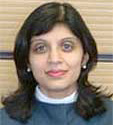
Dr Jyoti Choudrie leads the Systems Management Research Unit (SyMRU) in the Business School, University of Hertfordshire and holds the position of Reader of Information Systems. She has several years' experience of research on the social and policy aspects of Information and Communications Technologies, carrying out extensive research on the social aspects of e-government and e-governance, including the digital divide among silver surfers; and the usability of e-government web sites.
She has also consulted with a range of major organisations including AOL, Cable and Wireless and NTL.
top of pageRobin Christopherson
Head of Digital Inclusion, AbilityNet

After Cambridge University, Robin worked as an IT instructor for the Royal National Institute for the Blind (RNIB) and became a founding member of AbilityNet in 1998. Now globally acclaimed as leading experts in the field, AbilityNet specialises in accessibility auditing and disabled user testing, as well as helping clients design attractive websites that are both accessible and easy to use by all.
Despite being blind, Robin uses technology very effectively using speech output to access computers, the internet, his iPhone and many other technologies to assist him in his work. A member of the Guild of Accessible Web Designers, Robin has a first-hand appreciation of the importance of good web design and its impact on accessibility.
Robin also has courtroom experience as an expert technical witness in the area of assistive technology and in software, systems and website accessibility. In addition, he advises companies on their obligations under the Equality Act and the Disability Equality Duty including the evaluation of case specific reasonable adjustment. His current projects include raising awareness through AbilityNet's regular 'Tech for All' podcast.
top of pageLucy Dodd
Director, Inclusive Experience Ltd

During five years as the BBC's accessibility specialist, Lucy was responsible for "raising the bar" on accessibility across BBC Online and Mobile by encouraging project teams to engage with their users and integrate them into the product research, design, development and project management processes this approach resulted in a high-level of accessibility being achieved across BBC sites including Merlin, Radio 2 online, the BBC Homepage, Mobile Homepage, Mobile News, Food, Weather and the international Homepage.
Particular achievements include co-writing the BBC's Accessibility Standards and Guidelines, chairing its accessibility working group, leading the redesign of the BBC's flagship accessibility web site, My Web My Way; writing, directing and producing the pan-BBC e-learning course, and shaping the accessibility policy for BBC iPlayer, which went onto win a BIMA Award for Usability & Accessibility 2009.
Lucy set up Inclusive Experience Ltd, in November 2009, to move away from the traditional views and fears that surround accessibility implementation. Through training and coaching workshops, she wants to encourage organisations to engage with their rich variety of users and adopt a more practical, enjoyable, creative approach to accessibility.
top of pageDr Stephen Duckworth OBE
Strategic Development Director for Serco Welfare to Work and
Board Member, Olympic Delivery
Authority London 2012

Stephen was previously Regional Director West Midlands Flexible New Deal, Serco Welfare to Work. He holds a number of non-executive positions including Commissioner for the Commission on Assisted Dying Chaired by Lord Faulkner; Board Member for the Olympic Delivery Authority; Board Champion for Equality and Diversity; and Board Member, Employers Forum on Disability. He was also a Board Member on the National Quality Board chaired by Sir David Nicholson.
Stephen was a Founder and Chief Executive of Disability Matters Limited a world class company promoting diversity and equality and has received the honours of Officer of the Order of the British Empire and Fellow in Dental Surgery, Royal College of Surgeons for England.
top of pageDavid Fatscher
ICT Sector Development Manager, British Standards Institution (BSI)

David Fatscher has more than 25 years’ experience in data management, publishing and digital media, in a career that has included positions at Reuters Business Information and VisitBritain, the national tourism agency. He is currently Sector Development Manager with the British Standards Institution, responsible for the organisation's engagement and product development strategy with regard to accessible ICT.
top of pageMark Ferrar
National Technology Officer, Public Sector, Microsoft

For the past six years Mark Ferrar has been leading innovation and change in ICT in the National Health Service in England and has now joined Microsoft as National Technology Officer for Public Sector in the UK.
Previously Director of Technology Strategy for the NHS Technology Office, Mark has been rapidly establishing NHS information technology innovation at the heart of central Government.
For the past two years Mark has chaired the Government's Chief Technology Officers Council, set up to develop shared strategies and policies around IT enterprise architecture. He also chaired the cross-Government Architecture Review Board and was a member of the Public Sector Infrastructure Team's executive group.
Some of the initiatives he's been closely involved with include the G-Cloud, Data Centre Consolidation and Application Store programmes across the UK public sector and as a member of the Steering Groups for the Public Sector Network programme and the Government ICT Strategy Implementation. Mark has played a key role managing the NHS relationships with suppliers such as Microsoft, Novell, McAfee, Oracle, Cisco, Intel and AMD.
Mark joined the NHS in 2004 as Director of Infrastructure Architecture covering all infrastructure projects, services and standards, such as NHSmail and the N3 network. Prior to working for the NHS, Mark spent 17 years with ICI, the international chemicals and paint company (acquired by Akzo Nobel in January 2008), where he held a variety of IT management and architecture roles including Global Infrastructure Manager in the Office of the Global CIO.
Mark holds BSc (Physics), MBA and PhD (Engineering) qualifications, the latter for work on the computer simulation of flow-processed short-fibre reinforced composite materials whilst at Liverpool University.
top of pageMiro Griffiths
Disability Equality Consultant
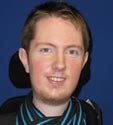
Miro Griffiths is a 21 year old postgraduate, completing a Masters in Disability Studies at the University of Leeds. As well as being a student, Miro also manages his own company, Miro Consultancy. As a Disability Consultant he travels across the United Kingdom, and occasionally internationally, whereby he speaks and advises on a range of issues relating to disability, especially around the importance of participation and empowerment issues, and transitional stages of a disabled persons life. He has also lectured at schools and colleges on the Disability module for NVQ Health and Social Care, advised on projects for the British Council, and been consulted by Premier League Football Clubs.
Miro was involved within the disability sector from the age of fourteen. Starting out with a Millennium Award for disability awareness, Miro went on to become the North West representative and Chairperson of the User Group for the Whizz Kidz charity. After working there for three years, Miro then became a member of Equality2025 the United Kingdom Government Advisory Network for Disability Issues. Miro is also a member of the Department of Work and Pensions Strategic Equality Panel, and sat on the Disability Advisory Panel for the Qualifications and Curriculum Authority; he has worked on a number of projects, as an external consultant, for the National Children Bureau, Council for Disabled Children, and Alliance for Inclusive Education.
Miro has a neuromuscular condition, which means he uses a power-wheelchair. In his spare time he likes to socialise with friends in the City of Liverpool; and is an avid supporter of Wigan Athletic Football Club due to actual disability reasons.
top of pageJonathan Hassell
Head of Usability & Accessibility, BBC Future Media

Dr Jonathan Hassell leads the BBC's work in ensuring BBC web, mobile and IPTV products are usable to all users by allowing production teams to engage with those users throughout product development.
He has almost 10 years' experience in the field of accessibility and inclusion, speaking regularly at UK and global events. He is the lead author of BS8878 the new British Standards on Web Accessibility launched in December 2010 and chairs its drafting committee, IST/45. He has commissioned groundbreaking Bafta-nominated eLearning projects using innovative new accessibility techniques and technologies, and won the Best Usability & Accessibility BIMAs in 2006 for the BBC accessibility information site My Web, My Way, and in 2009 for the accessibility features of BBC iPlayer.
top of pageSarah Hilderley
Accessibility Project Lead, EDItEUR

Sarah has worked in publishing for many years, most recently as Production Director at HarperCollins Publishers. Her work there included the creation of ‘prelims’, an international standard concerning social responsibility and ethical sourcing of a publisher’s third party suppliers.
EDItEUR is the international group coordinating development of the standards infrastructure for electronic commerce in the book, e-book and serials sectors. Sarah is taking the lead in EDItEUR’s involvement in the Enabling Technologies Framework, a three year project funded by the World Intellectual Property Organization (WIPO) under its visually impaired persons (VIP) initiative. Begun in June 2010 this project aims to provide advice on how publishers might evolve their mainstream publishing processes so that they are capable of delivering digital publications that are fully accessible.
top of pageClive Holdsworth
Head of Digital, Equality and Human Rights Commission

Clive is Head of Digital at the Equality and Human Rights Commission, the body responsible for regulating digital accessibility through the Equality Act 2011. He is currently engaged, in collaboration with BCS and AbilityNet, in developing ways of encouraging greater compliance with accessibility regulations and promoting better practice on accessibility.
Originally from the design and creative industries, Clive has spent the last 15 years developing websites, applications and digital services in private, public and third sectors in almost every industry and market. A keen advocate and evangelist for user-centred design, he has a passion for delivering products which are highly usable and accessible to all potential users.
top of pageKiran Kaja
Accessibility Engineer, Adobe Systems

Kiran works for the Corporate Accessibility team at Adobe Systems looking after Accessibility Standards and Policy initiatives in Europe and assisting Adobe product and sales teams to address accessibility issues. Kiran is also a member of ETSI STF 416 which is developing a new European Standard for Accessibility of ICT in Public Procurement under European Commission Mandate 376. Kiran has also worked with Royal National Institute of Blind People, SAP Labs and Code Factory in various accessibility roles.
top of pageMakayla Miranda Lewis
Centre for Human-Computer Interaction Design, City University London
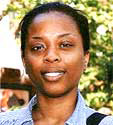
Makayla Lewis joined City University London, Centre for HCI Design in October 2008 to complete a PhD in human-computer interaction. More specifically she researches online social network experiences and challenges from a perspective of users with cerebral palsy. Makayla has a Masters by research in HCI and a first class BSc (Hons) degree in computer information system design (MIS). Her passion for her research and academic background is due to a personal connection to disability. As a primary caregiver for a parent with cerebral palsy, a volunteer at user-led organizations directed at people with disabilities and a British Sign Language learner. She has developed an exceptional understanding and a commitment to disability, computer-mediated communication and web accessibility.
top of pageChris Mounsey
Product Manager, VerseOne Technologies

Chris Mounsey is a web software developer, user interface (UI) and user experience (UX) expert and Product Manager for VerseOne, a web content management software developer specialising in Accessible web sites. He has also written for Ability Magazine on the subject of HTML5 and its potential for accessibility on the web.
top of pageTed Page
Director, PWS

Ted Page is a director of PWS. He is a former BBC web producer and member of the Corporation's web accessibility working group. He now regularly trains BBC departments, public sector bodies (UK and overseas), graphic designers/typesetters, corporates, charities and others in accessible PDF production techniques.
Ted runs the UK's only advanced level PDF accessibility course. He also regularly makes accessible a range of documents for corporates and government departments, from annual reports to information sheets to forms.
top of pageMichael Pluke
Vice-Chairman, European Telecommunications Standards Institute (ETSI) Human Factors Committee

Mike left British Telecom, where he led internal and external user interface standardization activities, to form the user experience consultancy Castle Consulting Ltd.
He is Vice-Chairman of the European Telecommunications Standards Institute (ETSI) Human Factors committee and has led and participated in many Specialist Task Forces developing standards and guides covering a wide range of user-related issues within ICT. Key themes of this ETSI work have included accessibility, personal identification, user profiles and privacy in ICT.
Currently Mike leads an ETSI Specialist Task Force producing a standard to support the European Commission Mandate M/376 on "European Accessibility Requirements for Public Procurement of Products and Services in the ICT Domain".
top of pageDr Mike Wald
Principal Investigator - Accessible Technologies, University of Southampton

Dr Mike Wald leads research and development in accessible technologies at the University of Southampton. He is principal investigator on the JISC funded REALISE project that is building an online platform and a community of people working to develop new open source software technologies that make using the Internet, computers and mobile devices easier for people who struggle with these systems.
Mike also teaches the MSc course "Universal Design and Assistive technologies" and supervises many student projects involving the development of open source accessible and assistive technologies.
top of pageSandi Wassmer
Managing Director, Copious and
Member, UK Government eAccessibility Forum
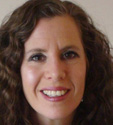
Sandi Wassmer is the Managing Director and Co-Founder of Copious, a digital agency specialising in building Inclusive Websites and is leading the move to integrating great design, accessibility, usability, web standards, user experience and other best practices under the umbrella of Inclusive Design.
Sandi is involved in a variety of advocacy activities, including writing a weekly blog for Action for Blind People, participating in the UK Government's eAccessibility Forum and working alongside government in writing and editing the eAccessibility Action Plan, which was launched by Ministers Ed Vaizey and Maria Miller in October 2010.
Sandi is a W3C member and participates in the Open Web Education Alliance (OWEA) and the Education & Outreach Working Group (EOWG).
top of pageGraeme Whippy
Group Disability Programme, Lloyds Banking Group
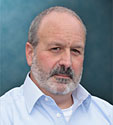
Graeme Whippy started his career in 1984 as an undergraduate teaching in the Computing Centre for People with Disabilities at the University of Westminster. Since then he has performed a variety of IT roles in client-facing and end-user companies, gaining experience of software/web development throughout the project delivery lifecycle.
In 2001 he joined Lloyds TSB as an IT project manager, but his passion and enthusiasm for accessibility resurfaced and in 2005 he succeeded in persuading the bank’s directors to set up the IT Accessibility Centre of Excellence. In 2009 his remit was broadened when he was invited by the Director of Group Operations to join Lloyds Banking Group’s disability executive steering committee and work full time on the Group Disability Programme which is charged with improving the Group’s performance on all matters affecting disabled customers and colleagues.
Outside Lloyds Banking Group Graeme has become well known as an advocate for accessibility and disability rights; he works with bodies such as the Employers’ Forum on Disability, RADAR, BSI and the EU Commission on mainstreaming inclusiveness for disabled people. His achievements in the field of IT accessibility were recognised in the 2009 Financial Sector Technology Awards where he won 'Outstanding contribution by an individual to the industry'.
top of pageGill Whitney
Head, Design for All Research Group, Middlesex University

Gill is the program leader for the Middlesex University MSc Digital Inclusion and lead the module on Design for All Regulation, Legislation and Standardisation. The Design for All Research Group of which Gill is head is the UK National Contact Centre (NCC) for The European Design for All e-Accessibility Network (EDeAN) and this year heads the Secretariat of EDeaN. EDeAN has members in 24 European countries and was established to raise the profile of Design for All the importance in achieving greater e-Accessibility.
top of page